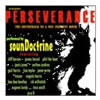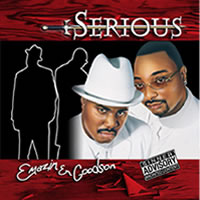|
|
|
Emazin & Goodson
By Conway Norwood, III Sometimes, when I hear nay-sayers talk about gospel rap, they paint holy hip-hoppers with this stigma of being carnal, proud, and no step higher than out of God’s will. Yet when I talk to gospel rappers, it’s amazing to see the humility and virtue that exude in their voices and character. Emazin & Goodson are no different. Talking with Paul Collins, alias Goodson, I knew I was talking to a saint. He’s God’s child, saved and full of praise, and he’s not to be placed in any category that labels him ungodly. Paul and his holy cohort, Erik “Emazin” Harvey have cranked out the sixteen-track Serious, and just as they tell us on their album’s title track, these guys are “serious as cancer.” Erik and Paul exemplify the fact that the key element that makes gospel rap the powerful Kingdom weapon that it is isn’t primarily the musical quality or the lyrical gift of the gospel rapper (even though Serious is full of both), but the lifestyle and the soul-borne holiness that enrich the music and the ministry of the lyricist. Like every other good artist, Emazin & Goodson rap what they know. They don’t mind opening up their souls and letting the world know that they’ve been through some things and that they’re still going through, and that through all of that, God remains their chief priority. They testify on “Like Job,” saying, “We got some pain this side, we got some tears we cry/Sometimes I wished I’d die from the hurt like Job/Now it’s a brighter day ‘cause on my knees I pray/Trustin’ in Him to show me the way like Job.” Thank God for cuts like “Celebrate” and “Move Like This” (featuring an outstanding cameo from King Ray) that keep your soul jumping and hot remixes that seal the envelope on the album, and you don’t make it halfway through without realizing that these guys ain’t playin’. I spent some time talking to Paul “Goodson” Collins, and asked him about the ministry, motives, and challenges of Emazin & Goodson... Conway: Introduce us to Emazin & Goodson. What are you guys all about and what do you want to accomplish? Goodson: We’re all about furthering the gospel first and foremost. Number two, we’re about not just being traditional. We want to touch people with the traditional message of the gospel, but with things that are personal to us as well. Sometimes, we act like just because we’re Christians we don’t go through everyday situations, but we do, and that’s just as much the gospel as the traditional message. We’re trying to minister to the whole man. Conway: Your album is called Serious. What brought you to the point where you realized that this ain’t a game? Goodson: Salvation is serious. A lot of times within the ranks of young people, we look and think, “I’ll do that when [I’m] 40 or 50.” It’s not a game because the enemy is not playing. He uses music and other avenues to try to captivate the [youth] and it seems like a lot of us are sleep on it. It’s one of those things that’s not a playing matter; we’re dealing with souls and moving forward. Conway: You mentioned that you find it useful to use what’s personal to you to spread the gospel. One of the songs on the album that I think is so powerful is “Like Job.” On that song, you say, “It’s a million Jobs all over the globe, and I’m one of’em…Now it’s a brighter day ‘cause on my knees I pray/Trustin’ in Him to show me the way like Job.” When and how did you get the revelation that God is a waymaker and a keeper? Goodson: There are so many different times, but I’ve always been one of those people that [knew] God had been tugging at me. He was tugging at me at a young age, and I didn’t know who it was. God would give me insight on certain things. I didn’t know what it was for. I didn’t know God was equipping me to go forward or was setting me up so that when I was ready, I would come. I think it was the same thing for Erik. I think the turning point for him was when his grandmother passed. His grandmother was the anchor of his family, and she was definitely a spiritual mentor. So when she passed, it made him realize that life is too short not to be serving God. For me, God built it up to a point where I couldn’t do nothing but say, “I’m so tired of what’s going on around me. God do what You want to do.” That was the point where God changed everything. I’ve always been open to things relating to faith, not necessarily my faith in Christ, but [just] relating to faith, not knowing that God was drawing me for Christ, but I was open period. If someone struck up a conversation about faith or religion, I was all ears. Conway: How did you know that gospel rap was the way that God wanted you to minister? Goodson: I rapped as a youth, and when I came of age, club music and rap was contributing to my self-destruction. I got saved, and God stripped me down. I didn’t listen to rap or anything that sounded like rap for about four or five years. I didn’t think I would be doing Christian rap, or any rap for that matter. It wasn’t until Eric and I met and God opened some stuff up that things started to happen. Before we knew it, we had an album. It was crazy the way it happened. I saw a group called the Council, and some other people that ministered, and I saw the reaction from the youth, and I listened to their ministry myself, and I said, “This is awesome.” I didn’t know that Detroit had such a huge Christian hip-hop community. We probably have one of the biggest in the country. Conway: Who are some of your other influences? Goodson: Anybody that’s pushing the gospel with heart. For one, my pastor, Joel Wallace. I have a lot of influences, but I love real people. I click with real people. There are so many people that indirectly and directly influence our lives, but I click with real people. Most of all, my wife, Eric’s wife, and our church family. Those are the people that really push us and inspire us to do what we do. Conway: You guys take God so seriously, but unfortunately, gospel rap is still a joke to so many Christians. What challenges do you encounter as gospel rappers and how do you overcome it? Goodson: We face challenges daily, not just from ministries that think “in” the box, but we’re in a Catch-22 situation; I heard a rapper say that we’re too hard for ministry, but we’re too soft for the streets. They put us in an awkward situation, but I believe that if God anointed you to do something and if He commissioned you, He’ll make a way. We might go places and people [look at us strange], but the Bible says the anointing destroys the yoke. I’ve been places where there were hardly any young people, but when we leave, they invite us back, and they’re buying the CDs because they recognize the ministry. I’m a praise leader at my church, and I [approach] what we do with this type of music the same way I [approach] praise and worship. I do it wholeheartedly, and I’m sure people feel that. I’m sure God moves on people. It’s not just performing. We definitely minister and we let God break down the barriers. Conway: What do you guys do to continue to grow spiritually and musically? Goodson: Spiritually, you have to stick with the basics, and you have to keep people around you that will sharpen you. There’s a lot of stuff that goes on in the music business. We used to be naïve and figure that everybody that proclaims Christ’s name is a child of God, not saying that they’re not, but everybody doesn’t bear those type of fruits. So spiritually, you definitely have to stay around people that sharpen you. My pastor is a visionary, and he’s serious about the work of God and the will of God. When it comes down to prayer and fasting, he won’t hold you up. That’s good for me because it keeps me on track. Musically, as artists, we want to evolve; we don’t want to be stuck in one spot. We always want the gospel message to be clear, but at the same time, [we ask ourselves], “Who are you ministering to? Are you just ministering to the church or are you trying to reach some people that aren’t churched and try to bring them over into Christ?” Like with anything, you want to perfect your gift, and if you don’t perfect it, God can very well take it and give it to somebody else. So we want to take it to the highest level possible musically. That means whatever we can incorporate in our stage show or whatever we can do to make our music better. We’re going to do something to that song “Like Job” real soon. We’re going to have somebody mime it and change the end where it climaxes. Things like that. As an artist period, you have to constantly reinvent yourself and that much more for Christian rappers because everybody’s still not taking us seriously. For more info on Emazin & Goodson visit:
|
|
|
Search Engine & Site MapHaven't found what you're looking for here? There is a wealth of information on Detroit Gospel.com. CLICK HERE to view our Site Map or type a search request below and click on the "Google Search" button to search this site for a specific person or topic. Click Here To Go Back To The Top of Page Trademark and Copyright Notices |
||
 The Thesis
The Thesis  An Invitation to Worship
An Invitation to Worship Live From Houston: The Rose of Gospel
Live From Houston: The Rose of Gospel  Home Once Again...Live in Detroit
Home Once Again...Live in Detroit Nights of Soul
Nights of Soul somethin' 'bout love
somethin' 'bout love  Live At Abbey Road
Live At Abbey Road


 All Day...The William Murphy Project
All Day...The William Murphy Project
 My Heart Depends On You
My Heart Depends On You Robert E. Norwood
Robert E. Norwood  The Covenant Project
The Covenant Project Perseverance
Perseverance Expectations: I'll Praise
Expectations: I'll Praise Feels Good
Feels Good  The Best of Thomas Whitfield
The Best of Thomas Whitfield This Time
This Time Here I Go Again
Here I Go Again Purified
Purified Gospel Today Presents: Praise & Worship Volume 2
Gospel Today Presents: Praise & Worship Volume 2


